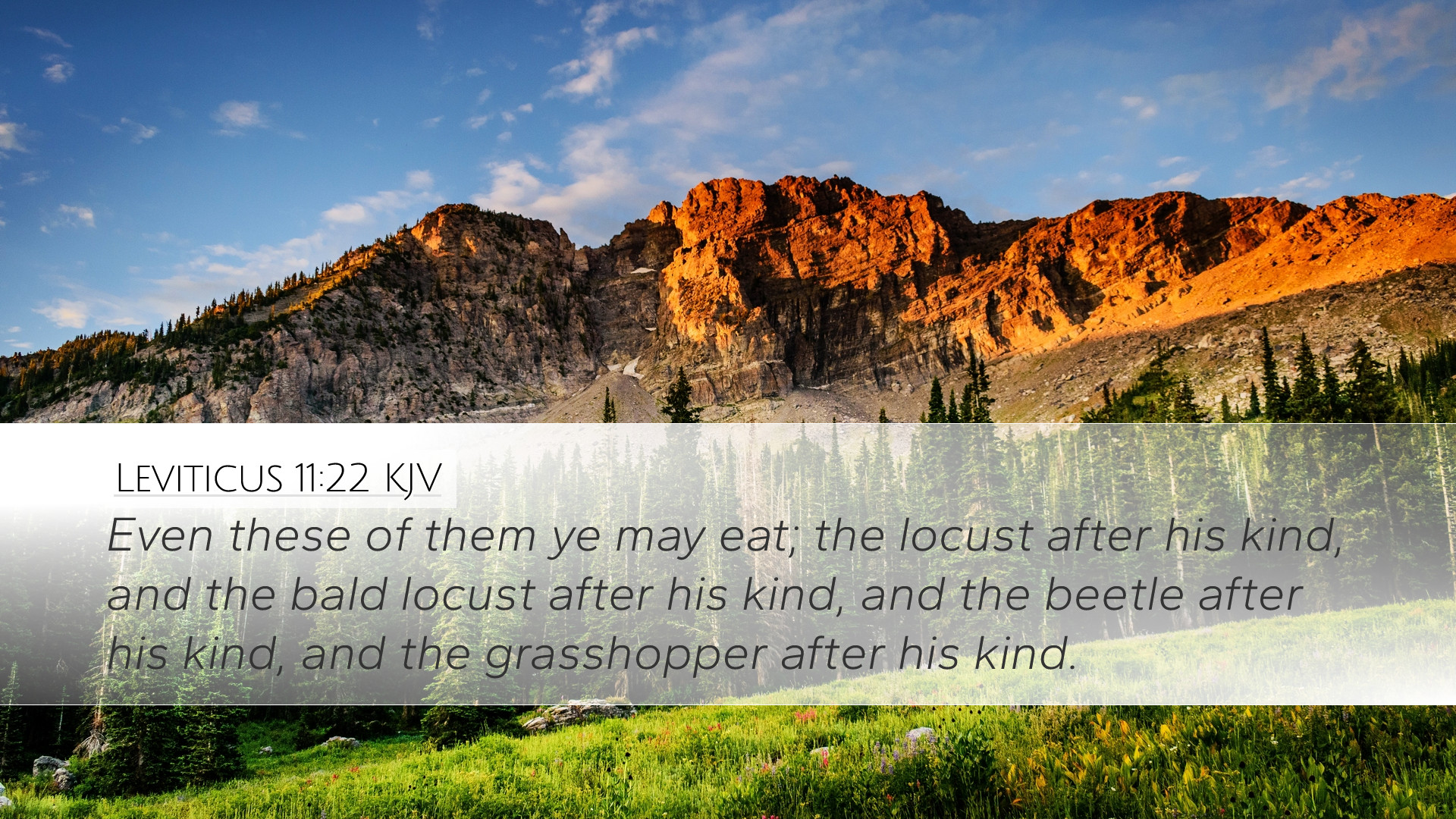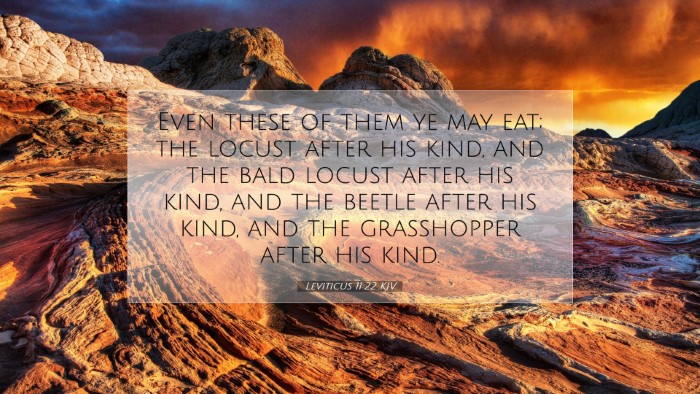Commentary on Leviticus 11:22
Verse: "Even these of them you may eat: the locust after his kind, and the bald locust after his kind, and the beetle after his kind, and the grasshopper after his kind."
Introduction
The dietary laws articulated in Leviticus 11 are a significant part of the Mosaic Law given to the Israelites. In particular, Leviticus 11:22 identifies specific insects that are permissible for consumption, reflecting broader themes of holiness, distinction, and obedience to God’s commandments. This commentary extracts insights from notable public domain sources to elucidate the theological and practical implications of this verse.
Contextual Insights
To fully grasp the meaning of Leviticus 11:22, it is crucial to understand its context within the chapter and the broader narrative of Leviticus. The book is primarily focused on the laws that govern the Israelites' worship and community life, emphasizing the holiness required from God’s chosen people. The dietary laws serve a dual purpose: promoting health and reinforcing the covenant identity of Israel.
Matthew Henry's Commentary
Matthew Henry notes that while much of the animal kingdom was deemed unclean, God permits certain flying insects, including locusts and grasshoppers. In his view, this permission serves to recognize God's provision for nourishment during times of scarcity, as in the case of locust plagues that often necessitated alternative food sources. Furthermore, Henry emphasizes that such regulations instill a sense of reverence towards God’s creation, illustrating that every creature has its place and purpose in His design.
Albert Barnes' Analysis
Albert Barnes further explores the characteristics of the insects mentioned in this verse, focusing on the notion of 'after his kind.' He discusses how each organism’s distinctiveness aligns with God's created order. Barnes suggests that the act of consuming permitted insects symbolizes a deeper spiritual truth—seeking to maintain purity in all aspects of life, including dietary choices. He connects these regulations to the broader principle of separation from the worldly practices surrounding the Israelites, endorsing the need for discernment and holiness.
Adam Clarke's Perspective
Adam Clarke addresses the cultural implications of these dietary restrictions by pointing out the significance of locusts within the ancient Near Eastern diet. He remarks that during difficult times, particularly in agricultural societies, locusts provided sustenance. Clarke also highlights that the verse lists a few specified insects but does not include all the varieties available, which invites further exploration into the rationale behind such selective provisions.
Theological Implications
Leviticus 11:22 serves as a microcosm of the larger theme of holiness in the Bible. The Israelites are called to distinguish themselves through their dietary habits, a commandment that extends beyond physical nourishment to represent spiritual health and identity. This intersection of physical and spiritual well-being is significant for contemporary Christians, emphasizing how believers today are also called to make choices that reflect their commitment to God.
Purity and Holiness
The dietary laws symbolize an overarching call to purity. As Henry, Barnes, and Clarke elucidate, what is consumed can reflect one's alignment with God’s will. Today, Christians might consider how their values and lifestyle choices—whether concerning what they eat or the broader habits they engage in—reflect their allegiance to God.
Spiritual Nourishment
The distinction between clean and unclean foods urges believers to seek spiritual nourishment that aligns with divine truth. Just as the Israelites were instructed to consume certain foods, modern believers are called to be fulfilled by the Bread of Life—Jesus Christ—and to seek after righteousness in all areas of life.
Practical Applications
In applying the insights from Leviticus 11:22, pastors and theologians can draw parallels between the dietary laws and contemporary Christian living. Here are a few practical considerations:
- Discerning Choices: Encourage congregants to practice discernment in their lifestyle choices, considering how their decisions align with biblical principles.
- Spiritual Identity: Reinforce the idea that one's identity as a child of God should permeate all aspects of life, including dietary habits, entertainment, and moral choices.
- Community and Holiness: Foster a community that collectively seeks holiness, supporting one another in living distinctively for Christ.
- Educating on Cultural Significance: Teach about the cultural context of biblical laws to help congregants appreciate their relevance and God's intentionality behind them.
Conclusion
Leviticus 11:22 serves as a reminder of God’s call for His people to live distinctly and to make choices that reflect His holiness. By examining this verse through the lenses of Matthew Henry, Albert Barnes, and Adam Clarke, we gain valuable insights into the implications of dietary laws that resonate with our faith today. The challenge for believers is to integrate these insights into their lives, ensuring their spiritual journey remains affirmatively grounded in the Word of God.


